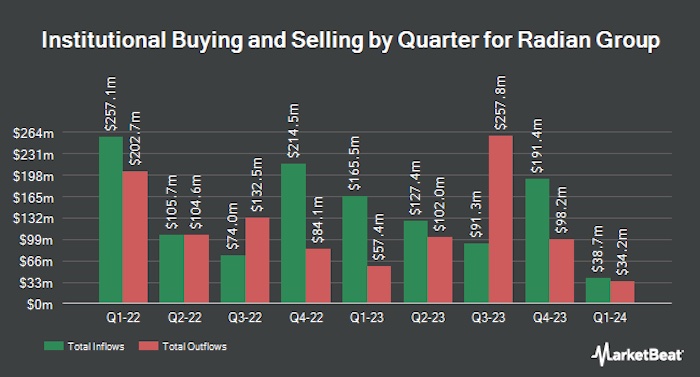New York Life Investment Management LLC recently disclosed that it lowered its stake in Radian Group Inc. (NYSE: RDN) by 2.9% during the fourth quarter. Specifically, the investment manager sold 459 shares of the insurance provider, decreasing its total holdings to 15,626 shares valued at around $446,000. This sale raises the question – why is New York Life Investment Management reducing its position in Radian Group?
A few potential reasons why the investment firm may be sourcing shares of Radian Group:
Economic Uncertainty Weighing on Insurers
The broader insurance industry faces economic uncertainty and potential headwinds in 2023. Rising interest rates, high inflation, and fears of a recession are creating a challenging operating environment for many insurers. As a provider of mortgage insurance and risk mitigation services, Radian Group’s financial performance tends to fluctuate with macroeconomic trends.
New York Life Investment Management may believe a weaker housing market and struggling consumers could negatively impact Radian’s bottom line. The US housing sector showed signs of slowing in late 2022 and mortgage rates remain elevated. By selling some RDN shares, the investment manager may be taking a more cautious stance towards the sector.
Valuation Concerns
At the time of New York Life Investment Management’s share sale, Radian Group traded around $28 per share. The stock’s valuation reached multi-year highs through 2021 and early 2022 amid a booming housing market.
However, as of Q4 2022, Radian’s forward price-to-earnings ratio still exceeded 9x, above its 10-year average valuation. As an insurance stock, RDN also commanded a premium valuation relative to other sectors.
After the stock’s strong run, New York Life Investment Management may have viewed Radian Group shares as overvalued and decided to lock in profits. Trimming its position would allow capturing recent gains while maintaining core exposure to the insurer.
Loss of Positive Catalysts
Part of Radian Group’s elevated valuation stemmed from positive industry tailwinds, low mortgage delinquencies, and strong financial results during the pandemic era. However, looking ahead to 2023, many of these catalysts could fade.
With mortgage rates above 6%, refinancing activity has evaporated and home sales are expected to moderate. This will likely pressure Radian’s new insurance policy volume and revenue next year. Additionally, as consumers face broader inflation and a potential downturn, mortgage defaults and claims could increase from very low levels – impacting financial results.
Without the positive volume and credit trends helping its recent performance, Radian Group may lack catalysts to drive further near-term stock gains. New York Life Investment Management seems to share this view – deciding now is a good time to take some profits off the table.
Portfolio Rebalancing
Asset management firms like New York Life Investment Management continually rebalance portfolios to manage risk, maintain target allocations, and realize profits. For large investment managers overseeing billions in assets, even small portfolio adjustments can involve selling or buying hundreds of thousands of shares.
Therefore, the sale of 459 RDN shares does not necessarily signal a hugely negative view. More likely, it represented minor rebalancing activity near the end of 2022. Trimming Radian Group exposure allows New York Life to redirect assets elsewhere or simply establish a more balanced portfolio alignment entering the new year.
Bottom Line
While New York Life Investment Management only sold a small dollar amount worth of Radian Group stock, the position reduction is somewhat notable given RDN’s substantial run-up over the past few years. The most plausible explanations center around valuation concerns, decreased positive outlook, and typical portfolio rebalancing procedures.
A cloudier macroeconomic picture and absence of housing market tailwinds fueling huge bottom line growth likely means Radian Group stock offers less upside potential in the near-term. New York Life seems to share this perspective – hence locking in some profits. However, retaining a sizable stake also displays longer-term confidence.


















